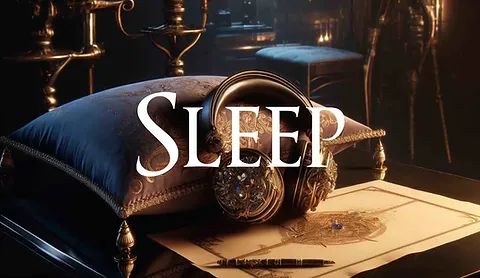ASMR Sleep Hypnosis
Where Gentle Whispers Meet Neural Science
Emma lies comfortably in her dimly lit bedroom with headphones on, listening to a soft, whispered voice guide her through a peaceful meadow. The gentle rustling of leaves and distant wind chimes create a cocoon of tranquility. This isn’t just another meditation video—it’s ASMR sleep hypnosis, a fascinating blend of two powerful relaxation techniques that are taking the sleep wellness world by storm.
The Rise of ASMR Sleep Hypnosis
Autonomous Sensory Meridian Response (ASMR) has evolved from a curious internet phenomenon into a legitimate tool for relaxation and sleep improvement. When combined with hypnotic suggestions, it creates an extraordinarily potent approach to addressing insomnia and sleep anxiety. The whispered words, gentle sounds, and strategic use of triggers help guide listeners into a deeply relaxed state where therapeutic suggestions can take root.
“It’s like being wrapped in a warm, sonic blanket,” describes Michael Chen, who struggled with chronic insomnia for years. “The combination of tingles from the ASMR and the hypnotic guidance helps quiet my racing mind in a way that over-the-counter sleep aids never could.”

The Science Behind the Tingles
Research suggests that ASMR triggers activate the same brain parts in human bonding and relaxation. These pleasant sensations are ideal for absorbing sleep-promoting messages when paired with hypnotic suggestions. The brain’s natural tendency to follow verbal guidance, combined with the deeply relaxing effects of ASMR, helps bypass the conscious resistance that often interferes with sleep.
ASMR Sleep Hypnosis and Alpha-Theta Neurofeedback: Powered by Sleep Recovery
The telehealth-based insomnia practice, Sleep Recovery, has pioneered combining these two modalities.
When Sarah first visited our sleep clinic, she was skeptical about combining technologies. “I’d tried everything,” she recalls. But the thought of using ASMR sleep hypnosis alongside neurofeedback seemed like overkill.” Three months later, she’s singing a different tune.
The integration of these modalities creates a synergistic effect. Alpha-theta neurofeedback helps train the brain to access optimal sleep states, while ASMR sleep hypnosis provides the perfect delivery system for sleep-promoting suggestions. The combination has shown remarkable results in both sleep onset and maintenance.
Dr. Jeffery Wilson, Clinical Director of Sleep Recovery, incorporates both techniques in his practice. He explains: “Neurofeedback creates the perfect neurological foundation, while ASMR hypnosis helps anchor those patterns with powerful psychological suggestions. It’s like building a house with strong foundations and beautiful furnishings.”
Frequently Asked Questions
Q: Is ASMR sleep hypnosis safe to use every night? A: Yes, it’s completely safe and non-addictive. Unlike sleep medication, regular use helps strengthen your natural sleep patterns.
Q: What if I don’t experience ASMR tingles? A: The hypnotic components are still practical, even without the tingles. Many people report improved sleep despite not experiencing the classic ASMR response.
Q: How long does it take to see results? A: While some people experience benefits from the first session, most notice significant improvements within 2-3 weeks of regular use.
Q: Can I combine this with my current sleep medication? A: Always consult your healthcare provider; these natural approaches can safely complement existing sleep treatments.
Q: Will I become dependent on it to sleep? A: No. Most users find that their natural sleep patterns improve over time, often requiring less frequent use of the recordings.
Personal Stories
Tom’s Journey
Tom, a high-stress executive, had relied on sleeping pills for a decade. “I was desperate to find a natural solution,” he shares. “Starting with ASMR sleep hypnosis was like discovering a secret passageway to rest. Adding neurofeedback took it to another level. Now, I’m sleeping better than I have since college, and I’ve lowered the medications by 70%.”
Maria’s Transformation
For Maria, postpartum anxiety had stolen her ability to rest. “The combination of ASMR sleep hypnosis and neurofeedback was like having a gentle, understanding friend guide me to sleep,” she explains. “The first time I experienced deep rest, I cried from relief. I’m not just sleeping six weeks in – I’m thriving.”
Theories on Why This Combination Works
Dr. Wilson believes that the COVID-19 pandemic has taken normal levels of anxiety in the American public to a different place altogether. He theorizes that many people now carry some level of unresolved trauma within them, which, in turn, could be causing substantial increases in both insomnia and anxiety. “Further research should be considered on this topic by the scientific community.”
Looking Forward
As research continues to validate these approaches, we see an exciting convergence of ancient wisdom and modern technology. Combining ASMR sleep hypnosis with alpha-theta neurofeedback represents a promising frontier in non-pharmaceutical sleep support.
Whether you’re dealing with occasional sleeplessness or chronic insomnia, this gentle yet powerful approach offers a path to natural, restorative sleep. It’s not just about falling asleep – it’s about rediscovering your natural rhythm and relationship with rest.
Remember, the journey to better sleep is personal. What works beautifully for one person might need adjustment for another. The key is finding your unique combination of triggers, suggestions, and brainwave patterns that guide you back to natural, refreshing.
-
Research on the Application of ASMR in the Development and Design of Sleeping Products. https://www.researchgate.net/publication/343154618_Research_on_the_Application_of_ASMR_in_the_Development_and_Design_of_Sleeping_Products
- Hypnosis Intervention Effects on Sleep Outcomes: A Systematic Review. https://pmc.ncbi.nlm.nih.gov/articles/PMC5786848/
-
Better than sleep: Theta neurofeedback training accelerates memory consolidation. https://www.sciencedirect.com/science/article/abs/pii/S0301051113002214
- An Alpha and Theta Intensive and Short Neurofeedback Protocol for Healthy Aging Working-Memory Training. https://www.frontiersin.org/journals/aging-neuroscience/articles/10.3389/fnagi.2016.00157/full
-
The effects of neurofeedback on attention and sleep in individuals with and without ADHD or insomnia: a literature review. https://www.researchgate.net/publication/356528393_The_effects_of_neurofeedback_on_attention_and_sleep_in_individuals_with_and_without_ADHD_or_insomnia_a_literature_review

